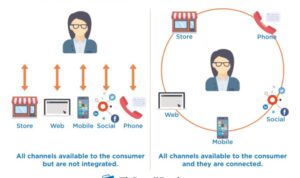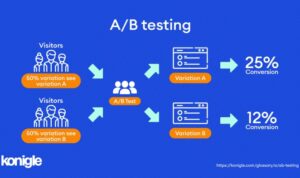Starting off with Online Business Marketing, this intro will give you a peek into the world of digital strategies and social media tactics that can take your business to the next level.
Importance of Online Business Marketing
In today’s digital age, online business marketing plays a crucial role in the success of companies looking to reach a wider audience and increase their brand visibility. With the ever-growing presence of the internet and social media platforms, businesses need to leverage online marketing strategies to stay competitive and relevant in the market.
Examples of Successful Businesses
- Amazon: By utilizing targeted online advertising, personalized recommendations, and a user-friendly website, Amazon has become one of the largest online retailers globally.
- Apple: Through innovative digital marketing campaigns, Apple has created a strong brand image and loyal customer base, driving sales of its products and services.
- Netflix: With a focus on content marketing and data-driven strategies, Netflix has revolutionized the entertainment industry and attracted millions of subscribers worldwide.
Reaching a Wider Audience, Online Business Marketing
Online marketing allows businesses to reach a larger and more diverse audience compared to traditional marketing methods. Through social media, search engine optimization, email marketing, and online advertising, companies can target specific demographics, engage with customers in real-time, and track the success of their campaigns more effectively. This increased reach and engagement can lead to higher conversion rates, brand loyalty, and ultimately, business growth.
Strategies for Effective Online Business Marketing

In the digital age, having a strong online presence is crucial for the success of any business. Utilizing various online marketing strategies can help businesses reach their target audience, increase brand awareness, and drive sales. Let’s dive into some key strategies for effective online business marketing.
Search Engine Optimization ()
Search Engine Optimization () is the process of optimizing your website to improve its visibility on search engines like Google. By using relevant s, creating quality content, and building backlinks, businesses can improve their search engine rankings and attract more organic traffic.
- Advantages:
- Cost-effective compared to paid advertising
- Long-term results as organic traffic continues even after initial efforts
- Disadvantages:
- Results take time to show, not instant
- Constant algorithm changes can impact rankings
Tip: Regularly update your website with fresh content and monitor performance to stay ahead in the game.
Social Media Marketing
Social Media Marketing involves using social media platforms like Facebook, Instagram, and Twitter to connect with your audience, build relationships, and promote your products or services. It’s a great way to engage with customers and drive traffic to your website.
- Advantages:
- Wide reach to a diverse audience
- Opportunity for real-time customer interaction
- Disadvantages:
- Requires consistent engagement to maintain visibility
- Platform algorithm changes can affect reach
Tip: Create a social media content calendar to plan and schedule posts for consistent engagement.
Email Marketing
Email Marketing involves sending targeted emails to your subscribers to promote products, share updates, and nurture leads. It’s a direct and personalized way to communicate with your audience and drive conversions.
- Advantages:
- Highly customizable and personalized content
- Cost-effective and high ROI compared to other channels
- Disadvantages:
- Risk of emails ending up in spam folders
- Requires careful segmentation and targeting for effectiveness
Tip: Segment your email list based on user behavior and preferences to send targeted and relevant content.
Content Marketing
Content Marketing involves creating and sharing valuable content like blog posts, videos, and infographics to attract and engage your target audience. It’s a way to build brand authority, establish trust, and drive organic traffic to your website.
- Advantages:
- Builds brand credibility and authority
- Increases organic traffic and improves
- Disadvantages:
- Time-consuming to create high-quality content
- Results may take time to show compared to other strategies
Tip: Repurpose your content into different formats to reach a wider audience and maximize its impact.
Utilizing Social Media for Online Business Marketing
In today’s digital age, social media plays a crucial role in promoting businesses online. With millions of users actively engaging on platforms like Facebook, Instagram, Twitter, and LinkedIn, businesses have a unique opportunity to reach a wide audience and increase brand visibility.
Role of Social Media Platforms in Online Business Marketing
- Social media platforms serve as a direct channel for businesses to connect with their target audience and share updates about products or services.
- Through social media, businesses can create engaging content, run targeted advertising campaigns, and interact with customers in real-time.
- Platforms like Instagram and Pinterest are particularly effective for showcasing visually appealing products and driving sales.
Examples of Effective Social Media Marketing
- Wendy’s – Known for its witty and humorous tweets, Wendy’s has successfully built a strong online presence and engaged with customers on Twitter.
- Nike – Nike leverages Instagram to showcase its latest athletic gear, collaborate with influencers, and run interactive campaigns to drive customer engagement.
- Sephora – Sephora uses YouTube tutorials and Instagram stories to provide makeup tips, product demonstrations, and behind-the-scenes content, creating a loyal community of beauty enthusiasts.
Importance of Engaging with Customers on Social Media
- Building brand loyalty: By actively engaging with customers on social media, businesses can foster a sense of community, trust, and loyalty among their audience.
- Feedback and insights: Social media provides a platform for customers to share feedback, reviews, and suggestions, which can help businesses improve their products and services.
- Increased reach: When customers engage with a business’s social media posts, it can lead to increased visibility and reach as their interactions are shared with their own network.
Creating Engaging Content for Online Marketing

Creating engaging content is crucial for successful online marketing campaigns. High-quality and engaging content can attract and retain the attention of your target audience, ultimately leading to increased brand awareness, customer engagement, and conversions.
Significance of High-Quality Content
Creating high-quality content is essential because it helps establish your brand as an authority in your industry, builds trust with your audience, and sets you apart from competitors. Engaging content also encourages social sharing, which can extend your reach and drive more traffic to your website.
- Ensure your content is relevant to your target audience’s interests and needs.
- Use a mix of formats such as blog posts, videos, infographics, and podcasts to cater to different preferences.
- Include compelling visuals, storytelling elements, and calls to action to keep your audience engaged.
- Optimize your content for search engines by using relevant s and meta tags.
Remember, the goal is to create content that not only educates and informs but also entertains and inspires your audience.
Repurposing Content for Maximum Reach
Repurposing content is a cost-effective way to extend the life and reach of your existing content. By adapting and sharing your content across different online platforms, you can reach a wider audience and drive more traffic to your website.
- Turn blog posts into social media posts, infographics, or video tutorials.
- Repurpose webinar recordings into podcasts or blog series.
- Create email newsletters featuring highlights from your blog posts or videos.
- Update and republish evergreen content to keep it relevant and drive more organic traffic.
By repurposing your content strategically, you can maximize its impact and reach without having to create new content from scratch every time. Remember to track and analyze the performance of your repurposed content to refine your strategy over time.












